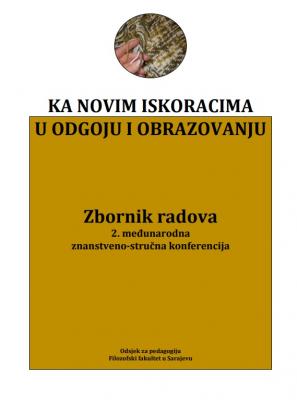DEKONSTRUKCIJA MOĆI (NACIONALNE) OBRAZOVNE POLITIKE NA PRIMJERU GRAĐANSKOG ODGOJA I OBRAZOVANJA
DECONSTRUCTING THE POWER OF (NATIONAL) EDUCATION POLICY ON THE EXAMPLE OF CIVIC EDUCATION
Author(s): Bojana Ćulum, Nadja Čekolj, Siniša KušićSubject(s): Politics, Civil Society, School education, Higher Education , State/Government and Education, Pedagogy
Published by: Filozofski fakultet Univerziteta u Sarajevu
Keywords: evaluation; civic education; local self-government; national education policy; ‘Rijeka model’;
Summary/Abstract: Civic education serves as an instrument for building a democratic culture and is especially necessary in a young democracy such as the Republic of Croatia. At the national level, there have been unsuccessful efforts to establish civic education since the nineties of the last century. Key obstacles responsible for it are the absence of serious political will to integrate this programme into the curriculum, as well as the instability in the educational system, that is, the initiation of numerous reforms without a clear vision and serious strategic considerations. Results of many research conducted at the national level reveal that both youth and adults lack a developed civic competence and basic knowledge about democracy, human rights and political processes. The City of Rijeka is the first town in the Republic of Croatia that has taken the initiative and introduced civic education as an extracurricular activity in 6 primary schools that it founded. For the purpose of monitoring the experimental implementation of the civic education and the improvement of its quality based on scientific evidence, an evaluation of the programme was conducted, the results of which will be presented in this paper. A comprehensive quantitative and qualitative research was conducted that included the participation of students (N=161), their parents (N=86) and teachers who implement civic education (N=6). The results point to positive shifts in the thinking and practical knowledge of students who attended civic education programme as opposed to those who did not. Based on the results of this research civic education programme was introduced in another 22 primary schools in Rijeka. Encouraged by this example, many local self-government units throughout Croatia have adopted the so-called ‘Rijeka model’ and thus contribute to the deconstruction of the power of national education policy and to strengthening the local ones.
Journal: Zbornik radova Odsjeka za pedagogiju
- Issue Year: 2/2018
- Issue No: 2
- Page Range: 94-107
- Page Count: 14
- Language: Croatian

